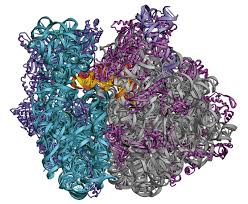ribosome
英 [ˈraɪ.bə.səʊm]
美 [ˈraɪ.bə.soʊm]
- n. [细胞][生化] 核糖体;[生化] 核蛋白体

中文词源
ribosome 核糖体
来自 ribose,核糖,-som,体,身体,词源同 chromosome.
英语词源
- ribosome (n.)
- 1958, coined by U.S. microbiologist Richard B. Roberts (1910-1980) from ribo(nucleic acid) + -some "body."
权威例句
- 1. Later work clearly showed that a ribosome contains many different proteins.
- 近的工作清楚地表明了核蛋白体包括许多不同的蛋白质.
- 2. Altman's area of expertise is the structure of ribosome, minute structures that synthesize proteins inside cells.
- 沃特曼的专业领域是核蛋白体的结构, 即细胞内合成蛋白质的微结构.
- 3. There were abundant mitochondria, rough surfaced endoplasmic reticulum and ribosome.
- 胞质内有丰富的线粒体 、 粗面内质网、核糖体.
- 4. Ribosome Ribosomes are structures in which proteins are made.
- 核糖体是蛋白质合成的基础.
- 5. Mycotoxin found in cereals. Binds to the ribosome and inhibits protein synthesis.
- 谷物中发现的毒枝菌素. 结合核糖体,抑制蛋白合成.